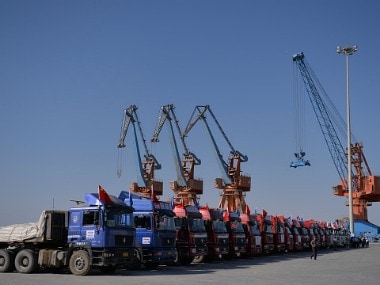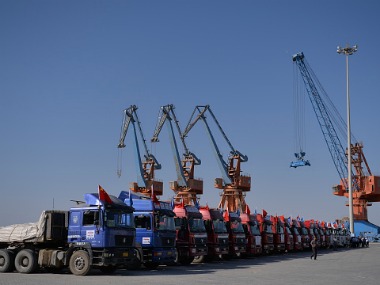The China-Pakistan Economic Corridor (CPEC) has its fair share of sceptics and opponents around the world, not least in India. Beijing and Islamabad have gone to great lengths to convince the world — again, not least, New Delhi — that the CPEC isn’t a venture aimed at antagonising the region. Now, according to a report published by a Belgium-based research group, the project risks fuelling discontent within Pakistan, that could eventually lead to conflict. [caption id=“attachment_3886433” align=“alignleft” width=“380”]
 Representational image. Getty Images[/caption] According to Crisis Group’s report titled ‘
China-Pakistan Economic Corridor: Opportunities and Risks
’, “…as currently rolled out, the corridor risks aggravating political tension, widening social divides and generating new sources of conflict in Pakistan… Beijing should also consult stakeholders in regions that will host CPEC projects it agrees upon with Islamabad. It should encourage Chinese companies to display sensitivity to residents of those areas, including by hiring local labour.”
According to a report in Gandhara
, the 29 June report by the Brussels-based think tank noted that if Islamabad fails to thoroughly debate the investments in Parliament and provincial legislatures and consult with locals, they are unlikely to revive Pakistan’s ailing economy. “Many of these problems stem from opaque policy formulation and the failure to heed regional and local concerns,” the paper noted, according to the report. “CPEC’s long-term plan (2017-2030) was formulated by the Centre with little input from local leaders, business or civil society actors.”
Representational image. Getty Images[/caption] According to Crisis Group’s report titled ‘
China-Pakistan Economic Corridor: Opportunities and Risks
’, “…as currently rolled out, the corridor risks aggravating political tension, widening social divides and generating new sources of conflict in Pakistan… Beijing should also consult stakeholders in regions that will host CPEC projects it agrees upon with Islamabad. It should encourage Chinese companies to display sensitivity to residents of those areas, including by hiring local labour.”
According to a report in Gandhara
, the 29 June report by the Brussels-based think tank noted that if Islamabad fails to thoroughly debate the investments in Parliament and provincial legislatures and consult with locals, they are unlikely to revive Pakistan’s ailing economy. “Many of these problems stem from opaque policy formulation and the failure to heed regional and local concerns,” the paper noted, according to the report. “CPEC’s long-term plan (2017-2030) was formulated by the Centre with little input from local leaders, business or civil society actors.”
The CPEC, which falls under China’s Belt and Road Initiative, has faced a number of accusations regarding a lack of transparency, Chinese firms and the wealthier parts of Pakistan benefitting disproportionately and has raised flags about China’s geopolitical intentions, according to a report in South China Morning Post.
“While it is too early to assess if CPEC can deliver the economic gains Islamabad promises, the project risks inflaming long-standing tensions between the Centre and smaller federal units, and within provinces over inequitable economic development and resource distribution,” the report added.
FM Shakil, writing in Asia Times , noted, “The $56 billion China-Pakistan Economic Corridor (CPEC) — a part of China’s ‘One Belt, One Road’ vision — has yet to translate into the game-changer envisioned by its sponsors. Worse than that, the unparalleled tax breaks and mounting security costs involved have already saddled Islamabad’s exchequer with a hole in its finances of more than $2.5 billion.” “There is absolutely nothing in the CPEC for the local trade and industry; even the labour is coming from China, which will cause a steep escalation in the operational cost of the project,” said Muhammad Ishaq, a leading industrialist and a director of Khyber Pakhtunkhwa Board of Investment and Trade in conversation, according to the Asia Times report. He added that CPEC will be a big disaster for Pakistan in the long run. “For all the risks and challenges, CPEC offers an opportunity to upgrade Pakistan’s aging and dysfunctional infrastructure, and revive a flagging economy,” the Crisis Group report stated. “But to deliver on these promises, both Islamabad and Beijing need to implement it with considerably more sensitivity and consultation than they have displayed thus far, with provinces and the communities most affected given a greater voice in shaping CPEC projects.”
)